Analysis: How is the political outlook for 2024 shaping up?
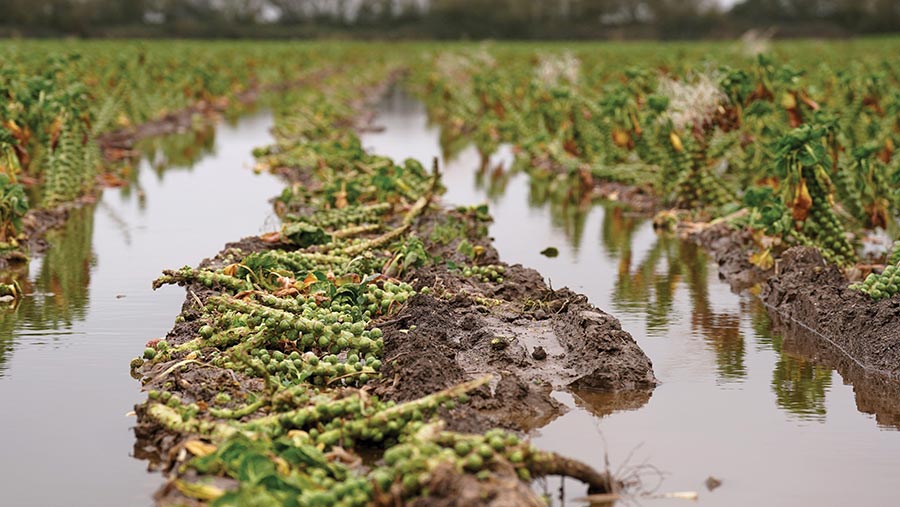 © PA Images/Alamy Stock Photo
© PA Images/Alamy Stock Photo Renowned 16th-century philosopher Nostradamus, who is credited with predicting the rise of Adolf Hitler and the Covid-19 pandemic, had some pretty interesting prophecies for 2024.
One of them was that this year would be one of drought and floods. We’re less than three weeks in and can already tick one of those off his list.
He also warned about a “red adversary becoming pale with fear” – though analysts have concluded he was referring to a possible war with China, rather than Red Tractor.
See also: Optimism on the wane as new year approaches

Will Nostradamus’ 2024 predictions come true? © Public domain
It is yet to be seen whether this prophecy will come true. But one thing is certain, volatility has become the new normal. This will be particularly true in 2024, because it is the biggest election year in history.
In 2024, some 4.2 billion people – more than half the world’s population – will be eligible to vote in more than 70 countries, including India, Russia, Iran, Mexico, South Africa, Taiwan, Pakistan, Brazil, the EU, the US and, of course, the UK.
Conservative woes
It goes without saying that changing government generates regulatory and policy uncertainty, in both the short and medium term. That is likely to be the case domestically, where a Sunak v Starmer election looms.
The Conservative Party, for its part, seems to have – very belatedly – woken up to the possibility of losing the rural vote it has been taking for granted.
At the election, it is expected there will be an attempt to connect farming to a broader agenda of economic growth, with new policies for the sector in the manifesto.
It is also rumoured that current leader Rishi Sunak is keen to make a break from the Boris Johnson era, which he believes was too environmentally focused, to the detriment of food production.
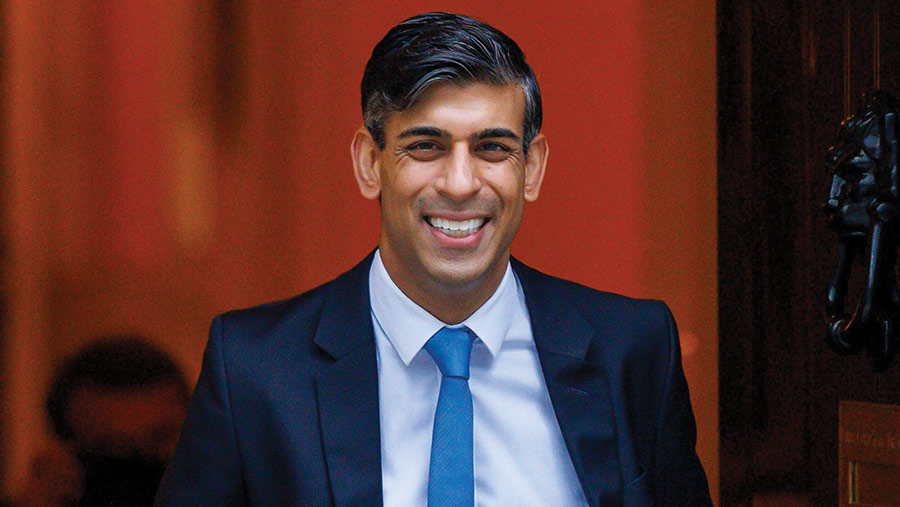
Rishi Sunak © Mark Thomas/Alamy Stock Photo
Defra ministers are already talking about how food production must be at the heart of the Sustainable Farming Incentive (SFI). What is not yet clear, however, is how they plan to actually tweak the policy so that it matches their rhetoric.
In the latest SFI upgrade, for instance, announced at the recent Oxford Farming Conference, it emerged that some of the best-paying arable options will mean taking land out of production.
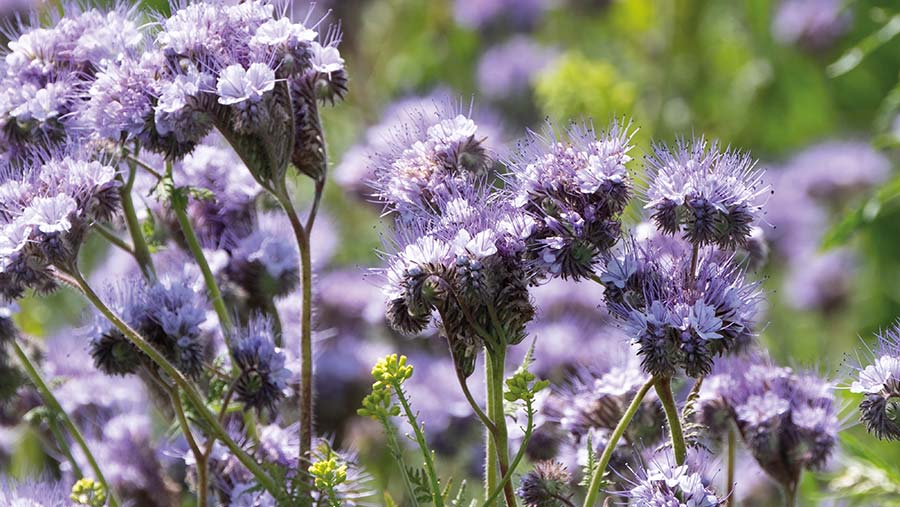
Some of the best-paying arable SFI options will require taking land out of production © Tim Scrivener
There is also pressure on land use and food production from the private sector, with big companies paying to plant trees to offset their carbon emissions – which raises big questions about food security.
During the Covid-19 pandemic, we saw countries such as India, Russia and Ukraine block exports to protect their food security.
This food nationalism is a trend that is likely to continue in a volatile world. And now we also have countries stockpiling food.
China, for example, has become obsessed with food security – perhaps as it looks to protect itself against sanctions in the event that it decides to invade Taiwan.
By the end of 2022, it had stashed away 65% of the world’s maize and 53% of its wheat, as well as massive supplies of fertiliser.
With all this in mind, we simply cannot expect that our food imports will remain secure.
Labour challenge
For Labour, the rural challenge is stark, with a snap Country Land and Business Association (CLA) poll on the eve of its conference last year showing 65% of members did not trust the party to support the countryside.
But that has not stopped Labour from selling its message to rural areas, acknowledging that it will need to win countryside seats to form the next government.
Labour leader Sir Keir Starmer put in a confident performance at the NFU Conference last year, which impressed many attendees.
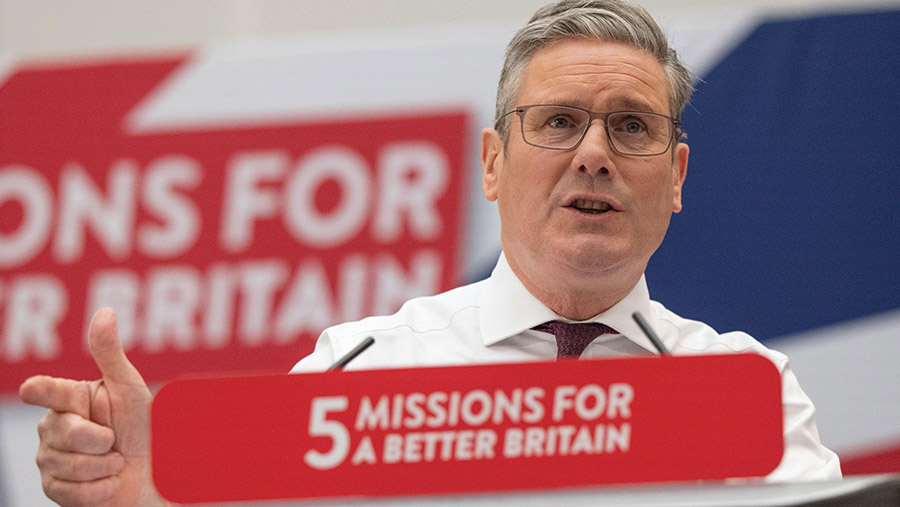
Keir Starmer © Gary Roberts Photography/Alamy Stock Photo
He subsequently chose to remove Jim McMahon from the Defra brief during his reshuffle in September.
Mr McMahon never really seemed to get to grips with the farming aspect of his portfolio, failing to mention it in his speech to the Labour conference when he was shadow secretary of state.
He seemed much more comfortable bashing the water companies for their performance on pollution and expending energy on promoting a Scottish-style right-to-roam policy, which has since been unceremoniously dumped.
Sir Keir’s decision to replace him with Croydon MP Steve Reed, who openly admitted he had no farming experience, left many people puzzled.
But those who’ve had him out on farm since seem to have been pleasantly surprised with his focus on food security and desire to listen and learn.
So far, we’ve had little in the way of policy promises on agriculture from Labour, and shadow farming minister Daniel Zeichner says we should expect the manifesto to be “top level” too.
Until recently, it was expected that Labour would pour its campaigning resources into rural seats.
But since the seismic by-election win in Rutherglen and Hamilton West, there is now speculation that those resources will be switched to urban seats in Scotland, which have become targets once more, because the SNP is haemorrhaging support.
Key election issues
Money
Money will be a key battleground in the upcoming election.
Last time round, in 2019, the Conservatives promised to maintain the inherited Common Agricultural Policy budget for England until the end of this parliament.
Since then, that budget, worth about £2.4bn, has been eroded by inflation. Environmental groups, as well as farming organisations, have said it needs to be increased to meet all of the government’s legally binding targets.
Despite this, both the Conservatives and Labour have been tight-lipped about whether the funding will be cut, boosted or stay the same come the election, though the Liberal Democrats, in the extremely unlikely event of them forming the next government, have promised an extra £1bn.
Farm policy
There is very little between Labour and the Conservatives on the Environmental Land Management (ELM) scheme either, with both parties heading in the same direction on farm support.
That stability may be welcomed by farmers who are sick of the ground shifting beneath their feet, but anyone expecting the UK election to be a battle of ideas is going to be sorely disappointed.
One Conservative activist recently said: “If we lose this time, there’s a chance we’ll only be in opposition for a short time, because Labour aren’t actually going to do anything different.”
Migration
The subject of migration is a fraught one, with big implications for the dairy and horticulture sectors in particular, which rely heavily on migrant labour.
For Labour, the narrative around immigration is less electorally risky – mainly because polling shows its voters are less concerned with it as an issue.
But there are many people in the old “Red Wall” seats who do rank immigration highly as a concern, and the party will need to have a clear policy in place come election time.
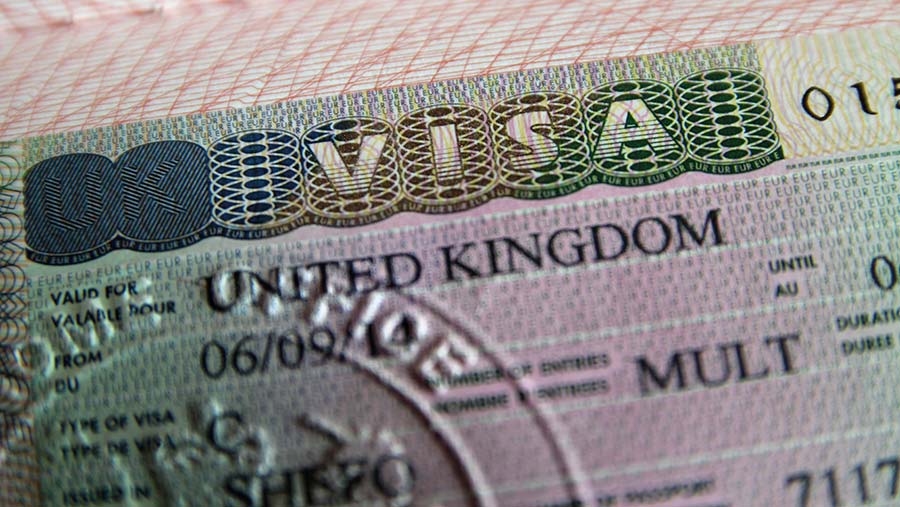
© Nastyakamysheva/ Adobe Stock
Rishi Sunak, on the other hand, is already in hot water here, having made “stopping the boats” one of his five pre-election pledges. There is also pressure from inside his party to go further.
The government has already outlined plans to double the minimum salary needed for British nationals bringing foreign relatives to the UK.
And now former immigration minister Robert Jenrick – an influential figure in the Conservative Party – is calling for the scrapping of the shortage occupation list, which allows roles with worker shortages to be given more relaxed visa criteria.
Other key players
While Labour and the Conservatives will make up the bulk of MPs in a new-look Westminster parliament later this year, they are not the only ones targeting countryside votes.
Reform UK – which used to be known as the Brexit Party – is currently drawing up an agricultural manifesto which will have big appeal to many farmers.
The party is standing candidates in every single seat, and they see rural areas as a key battleground.
Recent polling suggests Reform UK is on target to claim about 15% of Tory voters – not enough to win any seats, but definitely enough to strip the Conservatives of their majority and hand their seats to Labour.
And then there are the Liberal Democrats, who have been advised in recent years by former NFU deputy president Stuart Roberts, who is seeking a seat of his own.
The Lib Dems appear to be focusing much of their resource on key targets in the South West.
With our “first past the post” electoral system, where support for smaller parties needs to be geographically concentrated in order to translate into seats, this is smart politics, for sure.
